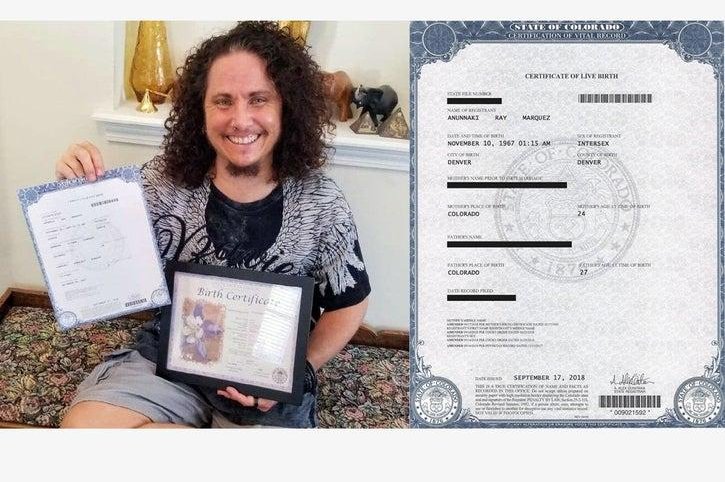1 of 2 | Anunnaki Marquez poses with an altered birth certificate from the state of Colorado where the gender has been changed from female to "intersex." Photo courtesy of Anunnaki Marquez
DENVER, Aug. 15 (UPI) -- For intersex people, born with both male and female chromosomal or sexual traits, new rules in several locations allow an "X" on birth certificates and drivers' licenses to help bring their status out of the shadows.
California, Colorado, New Jersey, New York City, Oregon and Washington now permit a non-binary designation on birth certificates.
These changes shed light on a condition formerly considered "shameful" that often has led to unnecessary childhood surgeries and hormone therapies, advocates say.
"If it isn't permissible to legally be intersex, then how can we ever protect children born intersex?" asked Sara Keenan, who was the first to successfully change the gender on a birth certificate to intersex in New York City in 2016.
Keenan, now retired and living in Mexico, also led the campaign to change California's drivers' licenses to allow the category of "nonbinary" in addition to male and female.
Keenan, a former paralegal, figured out at age 51 that medical treatments received as a teen for being too tall were connected to Swyer syndrome, she said.
Keenan had years of hormone therapy to counteract the condition, in which a person's cells have XY chromosomes typically found in men but also has some female reproductive structures.
Decades later, an endocrinologist confirmed that she was intersex. Keenan's father later admitted that parents and doctors had not revealed the truth about Keenan's sexual identity.
"When a baby is born with questionable genitalia, surgeries are almost always cosmetic," Keenan said. "I wonder what it would have been like to grow up knowing what I really was."
The American Academy of Pediatrics identifies 10 types of "disorder of sexual development" that can lead to both male and female sexual and physical traits. The former medical term for the condition was "hermaphrodite," which is now discouraged because it's considered stigmatizing.
In 2016, the United Nations condemned intersex childhood surgeries and treatments as a violation of human rights, saying the surgeries "are often irreversible and can cause permanent infertility and lifelong pain, incontinence, loss of sexual sensation and mental suffering."
The U.N. report said up to 1.7 percent of the human population is born with dual male and female sexual or hormonal traits. A new study released by The Endocrine Society in 2019 found about 1 in 1,000 babies was born with intersex traits.
In a 2017 statement from doctors at the Texas Children's Hospital Gender Medicine Clinic published by the American Academy of Pediatrics, the authors said after the birth of a child with a sexual variation, parents often feel pressured to choose male or female for the sex of a new baby in the first few days of life.
That choice can lead to a lifetime of surgeries and hormonal therapies, the authors of "Bringing Back the Term 'Intersex'" said.
"As the intersex option becomes available, the healthcare paradigm can become more society-centered rather than making a patient 'fit' the societal binary sex norm," the article said.
Last year, Georgia resident Anunnaki Marquez requested and received a change from the Colorado Department of Public Health and Environment on a birth certificate from female to intersex.
"People often confuse biological sex with gender identity and they are two very different things. An intersex person can have a gender identity of male, female, both or neither," Huntington Beach California-based psychotherapist Kristie Overstreet wrote in a supporting document to the Colorado Vital Records office.
Marquez who was raised as a girl and endured years of hormone therapy to counteract male traits like facial hair, has been married to his husband for years and has given birth to two children and adopted one.
"Intersex is both male and female at the same time. I live the life of a man. I am a man, but my biology is intersex," Marquez said.
Marquez also says a gender-neutral or intersex designation on a state document can give parents the encouragement to allow their children to grow up and make their own decisions.
"No body is shameful and anyone of age can decide on their own if they need surgery or not; they shouldn't have their parents and doctors make that decision for them," Marquez said.
Across the United States, in almost every state, residents can go to court to change their gender to match their gender identity on official documents like drivers' licenses and birth certificates -- often with proof of a sex-change operation or doctor's letter.
Only a few states have refused to allow a citizen to change their gender on records kept by official agencies.
In June, after a federal lawsuit against the records-keeping agencies, the Kansas Department for Health and Environment agreed to allow transgender residents to change their birth certificates to reflect their gender identities.
Policies in Ohio and Tennessee disallowing residents to change their birth certificate gender are being challenged in court by the American Civil Liberties Union and Lambda Legal, an LGBTQ legal rights organization.
Keenan said the new gender-neutral designation on some state documents begs the question of why the gender of a state resident is necessary in the first place?
"What a doctor saw between your legs on the day of your birth is not relevant information for a government," Keenan said.















